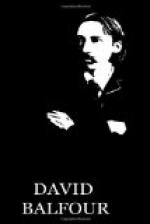“He’s a forfeited rebel, the more’s the pity,” said I, “for the man’s my friend.” I can only wish he had been better guided. And an accused murderer, that he is too, for his misfortune; but wrongfully accused.”
“I hear you say so,” said Stewart.
“More than you are to hear me say so, before long,” said I. “Alan Breck is innocent, and so is James.”
“Oh!” says he, “the two cases hang together. If Alan is out, James can never be in.”
Hereupon I told him briefly of my acquaintance with Alan, of the accident that brought me present at the Appin murder, and the various passages of our escape among the heather, and my recovery of my estate. “So, sir, you have now the whole train of these events,” I went on, “and can see for yourself how I come to be so much mingled up with the affairs of your family and friends, which (for all of our sakes) I wish had been plainer and less bloody. You can see for yourself, too, that I have certain pieces of business depending, which were scarcely fit to lay before a lawyer chosen at random. No more remains, but to ask if you will undertake my service?”
“I have no great mind to it; but coming as you do with Alan’s button, the choice is scarcely left me,” said he. “What are your instructions?” he added, and took up his pen.
“The first point is to smuggle Alan forth of this country,” said I, “but I need not be repeating that.”
“I am little likely to forget it,” said Stewart.
“The next thing is the bit money I am owing to Cluny,” I went on. “It would be ill for me to find a conveyance, but that should be no stick to you. It was two pounds five shillings and three-halfpence farthing sterling.”
He noted it.
“Then,” said I, “there’s a Mr. Henderland, a licensed preacher and missionary in Ardgour, that I would like well to get some snuff into the hands of; and as I daresay you keep touch with your friends in Appin (so near by), it’s a job you could doubtless overtake with the other.”
“How much snuff are we to say?” he asked.
“I was thinking of two pounds,” said I.
“Two,” said he.
“Then there’s the lass Alison Hastie, in Limekilns,” said I. “Her that helped Alan and me across the Forth. I was thinking if I could get her a good Sunday gown, such as she could wear with decency in her degree, it would be an ease to my conscience: for the mere truth is, we owe her our two lives.”
“I am glad to see you are thrifty, Mr. Balfour,” says he, making his notes.
“I would think shame to be otherwise the first day of my fortune,” said I. “And now, if you will compute the outlay and your own proper charges, I would be glad to know if I could get some spending-money back. It’s not that I grudge the whole of it to get Alan safe; it’s not that I lack more; but having drawn so much the one day, I think it would have a very ill appearance if I was back again seeking, the next. Only be sure you have enough,” I added, “for I am very undesirous to meet with you again.”




